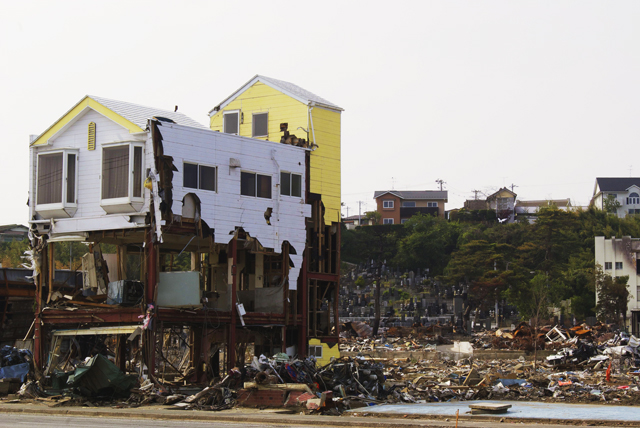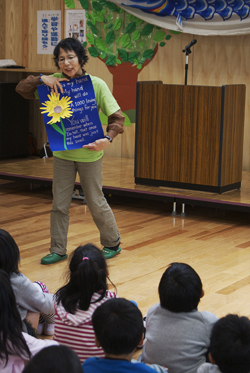
Ward’s adventure began in Professor Victoria Sama’s Law of Mass Communication class. Sama, Chair of the Department of Journalism and Mass Communication, announced that Fukiko Marshall, a local business owner, was looking for a student journalist to travel with her to Japan. The result was an article, written by Ward and published by the Times-Standard.
Marshall, 71, grew up in Japan. She lived there for 23 years before attending art school in Oakland and relocating to Humboldt County in 1971.
Having roots in Japan, Marshall is committed to helping people affected by the devastating earthquake and tsunami that shook the country in March 2011, killing over 15,000. On multiple visits, she brought both monetary donations and messages of hope and support to survivors in the most affected regions.
In an effort to increase awareness here in Humboldt County, Marshall sought out a student journalist, for an expenses-paid journey, who could help share her story.
“I don’t have a lot of money to donate to Japan,” Ward says. “I saw writing this story as my way of helping.”
In addition to giving her a way to help the survivors of the earthquake and tsunami, the journey to Japan also gave Ward a chance to jump into her future profession head-first.
“It’s exactly what I want to do in journalism: Cover big, impactful news that happens internationally—and bring it back home,” she says. “Even though Japan’s not in the news as much anymore, they’re still affected. There’s still water in the streets. There are still rooftops in the rivers.”
Ward met with Marshall several times before their departure to get acquainted with one another and to work out the details of their journey.
For Ward, planning for Japan was more complicated than for any other trip she had taken. Preparation went far beyond simply packing the right clothes for the climate.
Regarding her physical safety, Ward and her parents had to consider the nuclear situation and the possibility of further earthquakes. She took steps to limit her exposure to radiation, including stocking up on kelp tablets and iodine pills, which are believed to prevent some of the damaging effects of radiation. Although there were earthquakes as large as 5.0M during her stay, she was able to sleep through them.
Furthermore, Ward had to prepare herself mentally and emotionally for the destruction she would encounter and the stories of the people she would meet.
“Most of the damage there is from the tsunami, so we traveled along the coast,” Ward says. “There were so many rice fields that were flooded. Some had boats in them, some had debris—some had parts of people’s houses and furniture. But you have to keep moving.”

For at least 12 hours each day, Ward and Marshall would travel up and down the coast attempting to reach as many people as they could.
Marshall would approach people, handing out drawings, letters of support containing roughly $20 worth of yen and small bags of chocolate candies donated by Venlo Chocolates of Eureka.
Those who wanted to talk about their experience were invited to tell their story to Ward through Marshall. Despite surviving personal losses and the lingering destruction that tinged daily life, the people that Ward encountered were surprisingly optimistic.
“People were just trying to put their lives back together as quickly as they could,” she says. “For example, I interviewed a couple of taxi drivers and owners of taxi companies. Some of them lost drivers. Some of them lost all their cars. But after the tsunami, they started up their businesses right away.”
Seeing the destruction firsthand was a difficult experience for Ward. In addition to meeting people who had lost loved ones, she witnessed such sights as three-stories-tall piles of annihilated cars, mangled bikes and even streets littered with children’s shoes.
But Ward knew she’d have to deal with similar situations in her future as an international reporter.
“I knew as I was there that I should have been taking more notes, but it was hard taking in everything I was seeing and trying to manage it all,” she says. “You’re not watching this on TV. You’re there. You’re feeling it.”
“This is what I’m supposed to be doing,” she adds, “once I get a little bit thicker skinned.”
For more information, read Ward’s article, Humboldt County resident brings hope to Japan.